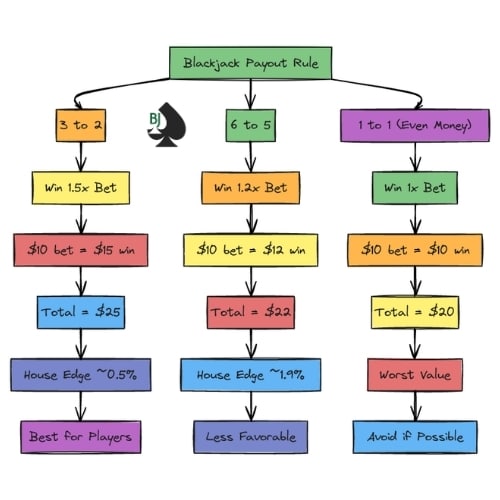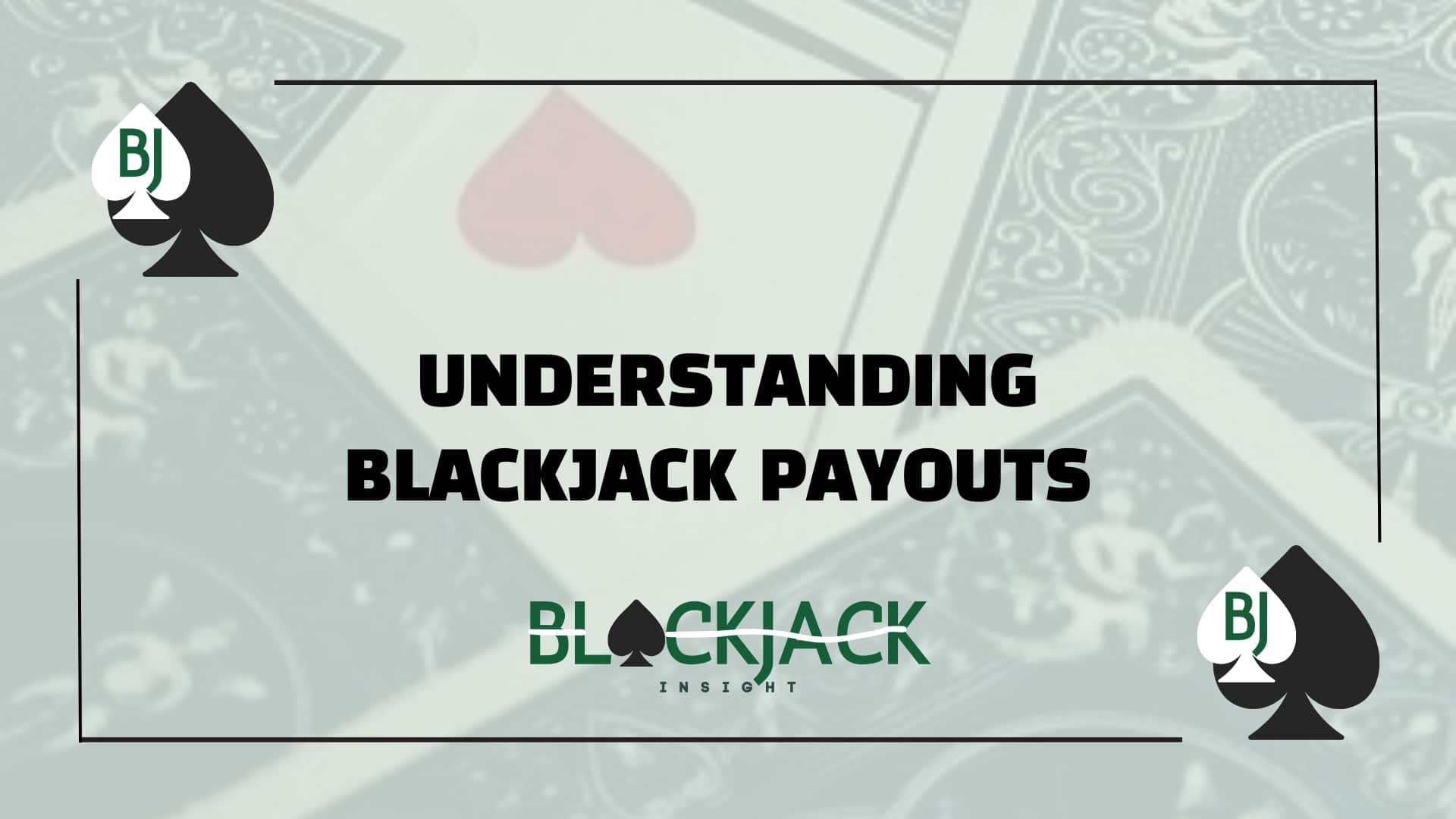Understanding Blackjack Payouts
Table Of Content
Blackjack payouts determine how much you win when you beat the dealer, and they vary by table. The best payout is 3:2, where a $10 bet pays $15 for a natural blackjack. However, many casinos now offer 6:5 or even 1:1 payouts, which significantly reduce your winnings and increase the house edge. A 6:5 table can add over 1% to the casino’s advantage. Always check for “Blackjack Pays 3 to 2” before sitting down, as payouts directly impact your long-term profitability.
Blackjack payouts aren’t just numbers printed on the table for decoration. They’re everything. They’re the fine print that decides whether you leave the table smiling… or wondering why your stack vanished faster than expected.
When I first started playing blackjack, like most beginners, I didn’t even think about payouts. I was too busy worrying about whether to hit or stand. But the more I played — and the more expensive my mistakes got — the more I realized one truth every player needs to hear: blackjack payouts can quietly make or break your game.
Blackjack is already one of the best games in the casino when it comes to odds. But sit down at the wrong table with bad payout rules? Suddenly, that advantage disappears — and you won’t even see it coming.
What Are Blackjack Payouts?
If you’re new to the scene, blackjack payouts simply refer to how much you get paid when you win. Sounds simple enough, right? But here’s the tricky part — not every blackjack win pays the same way.
That’s where casinos get clever.
The best payout you’ll find — and the one every experienced player hunts for— is the classic 3 to 2 payout for a blackjack. That means for every $2 you bet, a winning blackjack hand pays you $3. Place a $20 bet, get blackjack, and boom — you win $30 profit, plus your original $20 back.
But not all tables are that generous.
Many modern casinos, especially in tourist hotspots, offer 6 to 5 payouts. Doesn’t sound that bad on paper… until you do the math. That same $20 bet now only wins you $24. And some tables — avoid these like the plague — pay 1 to 1 on blackjack, meaning your $20 win gets you a measly $20 back. No bonus at all.
When you spread this difference across a few hands, it might feel small. But over a few hours, a weekend trip, or — if you’re like me — years of playing, the loss adds up fast.
Download Blackjack Payouts Chart

Why Do Casinos Change Blackjack Payouts?
Simple answer? More profit for them.
Casinos love the 6 to 5 payout tables because they increase their house edge dramatically. And sadly, a lot of casual players either don’t notice or don’t care. But if you’re here reading this, I’m betting you’re not like most players. You actually care about winning smart, not just gambling for fun.
Every time you hit blackjack at a 6 to 5 table, you’re handing free money to the casino that you could’ve kept for yourself at a 3 to 2 table. It’s like tipping the dealer without even knowing you did it.
Standard Blackjack Payout (3:2)
At a $10 bet, you get $15 in winnings for a blackjack. Simple enough. But many people I’ve met at the casino just assume all blackjack tables do that—until they get a rude awakening at the cashier.
For years, 3:2 was the default in most casinos. It’s part of what made blackjack so appealing. Lower house edge, plus fair returns on a natural.
House Edge Implications
Coupled with other player-friendly rules (like S17 or Double After Split), 3:2 keeps the house edge around 0.5%—assuming you use basic strategy.
The Rise of 6:5 and Other Lower Payouts
In a 6:5 payout game, a $10 bet on a blackjack nets you $12, not $15. That might look trivial, but over many blackjacks it adds up—believe me, I once lost track of just how much I gave up by playing a 6:5 table for hours.
Impact on the House Edge
Switching from 3:2 to 6:5 typically adds at least 1.4% to the house advantage. If you’re trying to eke out a profit or at least break even, that’s a massive difference.
Why Casinos Offer 6:5
Casinos found that players often don’t spot the subtle table signage or realize the math behind 6:5. So they introduced it to boost their profit margins, especially on games like single-deck blackjack that might otherwise favor the player. Read this to get details about the 6:5 payout.
Other Variations in Blackjack Payouts
There are also different payout ratios. Check these:
Even Money
This is when you have a blackjack, and the dealer’s upcard is an Ace. Essentially, you lock in a 1:1 payout no matter what happens next. But the odds usually don’t justify taking it unless you’ve got some advanced counting scenario going on.
Bonus Payouts
Some tables or side bets tempt you with boosted payouts for special hands (like suited blackjacks). They can be fun, but usually come with bigger house edges hidden in the details.
Variants Like Spanish 21
Specialty games like Spanish 21 or Double Exposure change payouts or have unique bonuses. They might sound appealing (“Get 3:1 for a 5-Card 21!”), but watch out for stricter overall rules or higher edges.
How to Protect Yourself Like a Pro
Honestly, this might be the simplest strategy tip I’ll ever give you: read the table before you sit down.
Don’t just plop your chips down anywhere. Look for that magic phrase: Blackjack Pays 3 to 2. If you don’t see it? Move on.
Sometimes casinos hide it in tiny letters on the table. Other times it’s blasted right in the center. Either way, check it. Always.
Proceed with Caution
Outside of blackjack itself, other hands pay out differently, too.
Insurance bets? They usually pay 2 to 1 — but let’s be honest, they’re rarely worth it unless you’re counting cards. Blackjack side bets? They might offer huge payouts like 10 to 1 or even crazier numbers, but their house edge is brutal.
In general, stick to the main game unless you know exactly what you’re doing.
FAQs
1. Why do casinos offer 6:5?
They boost their profit by lowering your returns.
2. Can I negotiate the payout?
Typically, no, unless you’re a high roller in a private setup.
3. Is 6:5 ever worth it?
Only if you’re just having fun and can’t find 3:2 anywhere else. Otherwise, you’re better off waiting for a good table.
4. Do I always look for 3:2?
Ideally, yes. Even if other rules look tempting, the lower payout rarely balances out.



